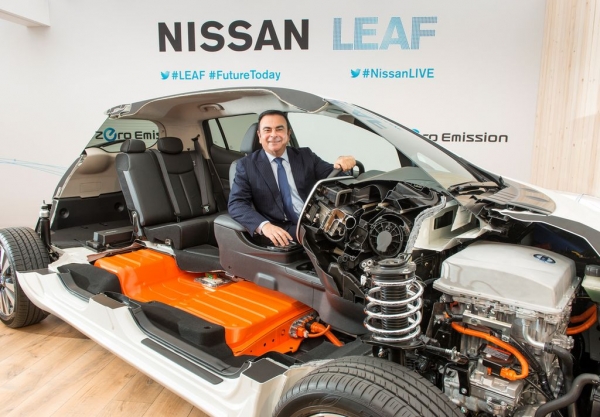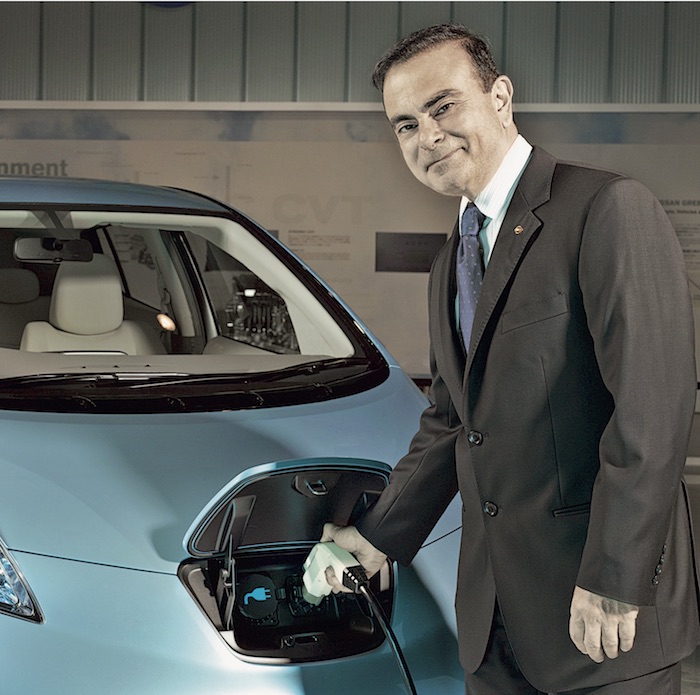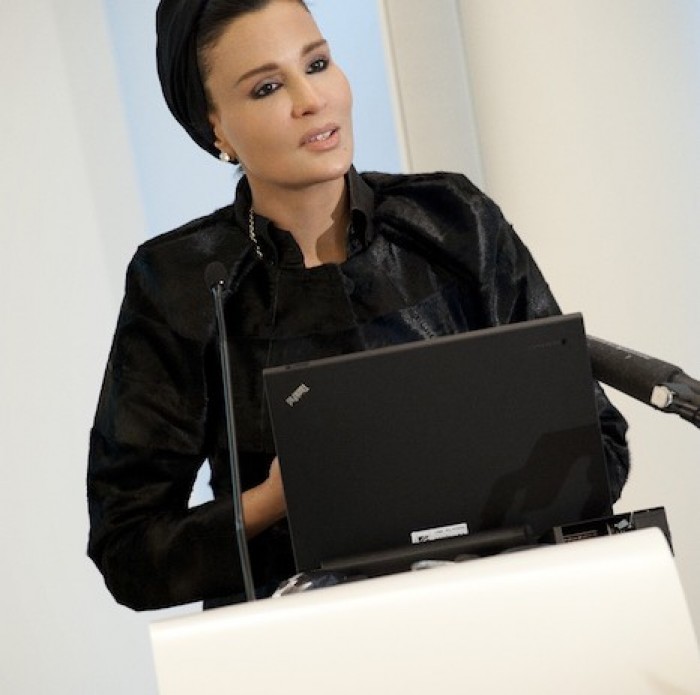Carlos Ghosn: A Legendary Leader
Stories of his outstanding successes in the auto industry have left the world simply awe-struck. His genius is baffling, his resilience admirable, and his humility even more so. The achievements of the Renault-Nissan Alliance CEO, Carlos Ghosn, have made him one of the most prominent and influential people in the auto industry.
Ghosn has been a huge inspiration to the world in general, and the Japanese in particular; so much that the story of his life has been turned into a comic book series in Japan, titled The True Story of Carlos Ghosn!
From the global financial crisis that afflicted the world in 2008 and the strategies Ghosn used to help the car industry sail through, to his exciting vision for a future of environmentally-friendly zero-emission vehicles, Today’s Outlook catches up with one of the busiest men in the world for an exclusive one-on-one.
Ghosn shares insightful information about his career, latest endeavors and plans, as well as a personal glimpse into the family man behind the infamous professional.
How has the global financial crisis affected the car industry?
The global financial crisis first dealt a blow to corporate financing, then to the consumer and, in turn, it was a double hit to the car industry. The consequent credit crunch and disruption of liquidity triggered a slowdown in consumption. Trust was lost in the banking system, and, as you know, trust is the basis of economic activity and of credit. Without trust there is no lending, and without lending there is no economy. Two-thirds of car sales are based on loans, and as banks tightened their lending, we knew the global car market was headed for recession – and that’s exactly what happened! Looking at the results for 2009, we can say that the worst of the crisis is behind us. It was a very challenging year, but the global market is showing signs that it is no longer depressed. That is not to say, however, that there is no uncertainty. We are cautious in two markets: Japan and Europe. The European market might have done well in the first quarter of this year, but we estimate that it may decline by 10 percent. Speaking for Nissan, I think that the global financial crisis has helped us to reassess our priorities. As we recover our company’s performance, we remain focused on delivering quality to consumers worldwide, building synergies within Alliance and pursuing strategies that are important to our future, such as Nissan’s commitment to affordable and sustainable mobility.
What were your immediate strategies to pull through?
We mobilized quickly to redefine our short-term priorities. For example, we shifted focus to increase free cash flow and to optimize cash management. Such measures are necessary in an environment in which funding resources are scarce and financing costs are high. We also suspended our mid-term plan to make sure that everyone was focused on our free cash flow imperatives. In times of crisis, it is important that management and employees share a common vision and work toward specific and limited objectives to deliver results. I think we were able to do that. We did not deviate from our long-term strategy. We did not compromise. While we decreased or postponed specific R&D expenses, we safeguarded our strategic projects, such as zero-emission cars, batteries and the V-platform and we accelerated investment in our electric car, the Nissan LEAF. By 2010 year’s end, Nissan will be completely recovered from the crisis and well positioned, with Renault, to be the number-one zero-emission car-maker in the world.

Tell us about your vision of a future with zero-emission vehicles.
Zero-emission vehicles will play an important role in our industry in the future. We are increasingly concerned about congestion, urban air pollution, climate change and dependence on oil, and electric vehicles are adequately addressing the latter two problems. By 2020, we estimate that 10 percent of all vehicles will be zero-emission. In addition to electric vehicles, car-makers are offering a range of technologies, in order to boost fuel efficiency and reduce emissions, from improved internal-combustion engines and hybrid vehicles to clean diesel and fuel-cell vehicles. The Renault-Nissan Alliance is mass-marketing affordable zero-emission vehicles, developing a sustainable mobility system on a global scale. By 2013, you are going to see eight new models from Nissan and Renault, including the Nissan LEAF and Renault’s Zoe. These two models will be the big volume cars for Nissan and Renault. What sets us apart from other car-makers is that our objective is not only the car, it is also the consumer. Our approach is a holistic one; not only are we involved in the production of the vehicle and the battery, we’re also involved in developing the physical infrastructure and social framework to support electric vehicles. By this, I mean recycling the battery, helping to set-up the charging posts, and engaging governments in dialogue to provide incentives to make electric cars more affordable to consumers. It’s not just about providing an electric car; it’s about creating an environment for sustainable mobility. That is what Nissan provides.
Renault and Nissan are heavily investing in these eco-friendly electric cars; what are the strengths and weaknesses of these vehicles?
I think the inherent strengths of these vehicles are becoming increasingly understood by consumers. Zero-emission electric vehicles can provide affordable, sustainable mobility to consumers worldwide, and Nissan is in a good position to lead the way to this outcome. To date, the Nissan LEAF has already 135,000 handraisers in the U.S. and more than 13,000 pre-orders – which is very encouraging. As I said, electric cars are a solution to many anxieties and problems confronted by societies today, and the electricity to power them is available in many forms. These vehicles are neutral to the environment, so consumers can have attractive cars with good performance along with the eco-friendly benefits. Our challenge is to deliver performance, affordability and cost at a level that will satisfy our customers. Batteries require a lot of investment, but we are building our own capacity and working to reduce costs. We are maximizing synergies among Nissan, Renault and now Daimler to share technologies, components, vehicle platforms and, eventually, assets.
Your defiance of tradition and unique vision has catapulted you into business superstardom. What is the driving force behind your confidence and impeccable decision-making?
I have always believed in the power of a clear vision, which helps to guide consistent decision-making, boost motivation and build confidence. The vision has to be straightforward, based on a lucid assessment of reality, and yet appealing so that people will want to work with you to achieve a common goal. It is true that nothing begins unless one person takes the first step, but real and lasting progress requires many people to take action. As a leader, I am not afraid to take a first step, and I do so with the confidence that our corporate vision has been built with the involvement of a cross-functional, cross-cultural team of people who understand it and are willing to act to achieve it.
What do you believe will be the biggest field of investment in Lebanon during the next ten years?
I think Lebanon is particularly fit for the development of a wide range of services. The biggest investment will take place to make services, such as banking, health, and tourism, continue to develop and draw a lot of interest not only from the Lebanese population outside of the country, but from foreigners as well. But it is also a country in which technology can be developed because a lot of capable engineers would love to stay within the country to develop technology helpful to Lebanon and at the level of global companies. As long as there is a common sense agreement on a good, consensual political platform, I have no doubt that Lebanon’s future will be bright and its financial system will flourish.
Dubbed as Le Cost Killer, you are known for your successful cost-cutting strategies; are there plans to introduce an affordable car model that can compete with high-end vehicles?
Nissan has two global brands: Nissan and Infiniti. The Nissan line-up has a range of high-quality vehicles that offer appealing designs, solid driving performance and maximum value. The Infiniti brand is the ultimate expression of modern Japanese luxury, offering inspired performance to luxury car-buyers. Both the Nissan and Infiniti brands function extremely well in the markets where they compete. We have no plans to blur the brand identities of either by mingling models between the two line-ups.
In your opinion, what is the ultimate formula for success in the business world?
Success is purpose-driven. In business, success requires a clear vision with clear, prioritized objectives and effective performance. I think that in our global economy, it is also important to respect the differences in thought, ideas and practice that exist among people from other countries and cultures. It is not enough to be smart and rational. Success depends on earning the trust of all your stakeholders. Many characteristics are common among successful people: They are interesting, flexible, determined, effective, motivating. In my opinion, successful business people are those who create value and produce measurable results while respecting the identities of others and connecting with others globally.
You have an incredibly busy work schedule, how do you manage to devote time to your family?
Over the years, I have adjusted gradually to the demands of my schedule. I am fortunate to have the support of people who coordinate my time at Nissan and Renault, and our chief operating officers work closely with me, wherever I am, to maintain high levels of performance. Time with my family is precious to me, and I make sure that I’m fully present when I am with them. I don’t discuss work at home. Rather, I talk about things such as my children’s education, vacation, what books we’re reading… This is how I strike a balance in my life.
What advice can you offer to the young and aspiring Lebanese businessmen and women?
Think big and act in consequence. You have to shape and challenge yourself. Work hard. Accept challenges, and also accept failures.
































